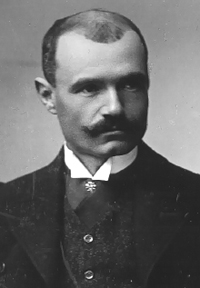Mihailo Petrović-Alas
| Mihailo Petrović | |
|---|---|

Mihailo Petrovic-Alas, 1905 photograph
|
|
| Born |
6 May 1868 Belgrade, Principality of Serbia |
| Died | 8 June 1943 (aged 75) Belgrade, Nedić's Serbia |
| Residence | Yugoslavia |
| Nationality | Serbian |
| Fields | Mathematician |
| Institutions |
Belgrade University Serbian Royal Academy |
| Alma mater |
Belgrade University École Normale Supérieure |
| Doctoral advisor |
Charles Hermite Charles Émile Picard |
| Doctoral students |
Mladen Berić Miloš Radojčić Danilo Mihnjević Dragoljub Marković Sima Marković Jovan Karamata Radivoj Kašanin Dragoslav Mitrinović Konstantin Orlov Tadija Pejović Ivan Arnovljević |
| Known for |
Differential equations Phenomenology |
Mihailo Petrović Alas (Serbian Cyrillic: Михаило Петровић Алас; 6 May 1868 – 8 June 1943), was an influential Serbian mathematician and inventor. He was also a distinguished professor at Belgrade University, an academic, fisherman, writer, publicist, musician, businessman, traveler and volunteer in the First and Second World Wars. He was a student of Henri Poincaré, Charles Hermite and Charles Émile Picard. Petrović contributed significantly to the study of differential equations and phenomenology, as well as inventing one of the first prototypes of an analog computer.
Petrović was born on 6 May 1868, in Belgrade, as the first child of Nikodim, a professor of theology, and Milica (née Lazarević).
He finished the First Belgrade Gymnasium in 1885, and afterwards enrolled at the natural science-mathematical section of the Faculty of Philosophy in Belgrade. At the time when he finished his studies in Serbia in 1889, several Serbian mathematicians who had acquired their doctorate degrees abroad, like Dr. Dimitrije Nešić (at Vienna and Karlsruhe Institute of Technology), Dr. Dimitrije Danić (at Jena, 1885) and Bogdan Gavrilović (at Budapest, 1887) were beginning to make a name for themselves. Subsequently, in September 1889, he too went abroad, to Paris to receive further education, and to prepare for the entrance exam to the École Normale Supérieure. He got a degree in mathematical sciences from Sorbonne University in 1891. He worked on preparing his doctoral dissertation, and on 21 June 1894 he defended his PhD degree at the Sorbonne, and received a title Docteur des sciences mathematiques (doctor of mathematical sciences). His doctorate was in the field of differential equations.
...
Wikipedia
